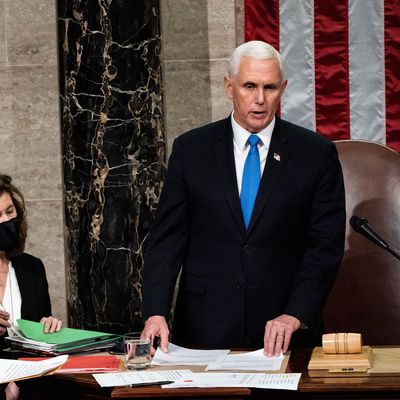
To no one’s surprise, Donald Trump and his supporters are planning to use the new criminal proceedings against him to repeat and even amplify his conspiracy-theory-laden take on the 2020 elections and their violent aftermath. One of Trump’s defense attorneys has already vowed to “re-litigate every single issue in the 2020 election,” arguing that the case offers Trump “an opportunity that he has never had before, which is to have subpoena power since Jan. 6 in a way that can be exercised in federal court.”
As the saying goes, “when you are a hammer, everything looks like a nail,” and Trump has been hammering away in defense of his stolen-election claims, virtually without pause, since the fraught events for which he now faces felony charges. But he’s not the only Republican presidential candidate who will have to relitigate the 2020 election thanks to the inevitable media focus that will accompany every step toward a Trump trial. To varying degrees, Trump’s rivals have avoided any extended comment on his “rigged election” claims for two obvious reasons. First, rolling eyes at Trump’s obsession with 2020 has been explicitly or implicitly central to the “time to move on” message shared by all the candidates. And second, the sweet spot for non-Trump candidates has been to vaguely identify with the indistinct view of a majority of Republican voters that Joe Biden’s election as president was not “legitimate” without getting down in the weeds of specific fraud claims or attacks on voting by mail or the means Trump chose to overturn the results.
Unfortunately for Trump’s rivals, the road to the Republican presidential nomination now runs right through those weeds, and it will be difficult for them to evade controversial comments or change the subject. One candidate, Mike Pence, is himself a central character in the narrative of Trump misconduct laid out in Jack Smith’s indictment, and it appears he has decided to embrace his identity as the skunk at the January 6 picnic. Three other minor candidates, Chris Christie, Asa Hutchinson, and Will Hurd, have already made it clear they think Trump disqualified himself from the presidency before, during, and after January 6. For all these men, the indictment and the trial, particularly if it happens before the GOP nomination is decided, are fine opportunities to get booked on mainstream media shows and appeal to the narrow but discernible band of strongly anti-Trump Republicans.
But for other candidates, including those within shouting distance of viability as candidates, and who might perhaps eye a role in a second Trump administration as a consolation prize, the focus on 2020 is as unwelcome as it is unavoidable. Neither Ron DeSantis, Vivek Ramaswamy, Tim Scott, or Nikki Haley want to alienate MAGA voters. But they also understand that differentiating themselves from Trump, and maintaining some general-election appeal to swing voters who think election denial is nuts, is important as well. How they answer renewed questions about 2020 and January 6 could be significant.
The interrogation has already begun, and DeSantis is changing his tune, telling a reporter on Friday that the 2020 stolen-election theories “did not prove to be true.”
And Ramaswamy was asked a question that other candidates will almost certainly face in the wake of the latest indictment, notes Politico:
Ramaswamy would not say if he would have certified the election results like former Vice President Mike Pence did on Jan. 6, 2021, sidestepping repeated questions on Thursday. “I would have never let it get to that point,” Ramaswamy said in response to POLITICO’s questions. “I would have never put myself — or been part of an administration, if I was in a serious position of leadership — to ever have allowed us to have gotten to that doorstep.”
That’s a nice world salad from the normally precise-speaking Ramaswamy, but it’s really a yes-or-no question. Anything other than “no” could upset the lovefest the young tech tyro has been conducting with Trump and his supporters.
Tim Scott and Nikki Haley are going to have difficult moments as well. Scott actually voted to confirm disputed Biden electors in Arizona and Pennsylvania on January 6 and has curtly dismissed the idea the election was stolen. But like Ramaswamy, he’s tried to snuggle up to Trump and the MAGA movement while running for president. What will he have to say when the detailed questions are asked?
In Haley’s case, the inconsistency of her comments on Trump and the events of January 6 has been a problem. The day after the Capitol riot, Haley told a Republican National Committee meeting that Trump’s “actions since Election Day will be judged harshly by history.” But then on multiple occasions since then, she’s praised the impact he’s had on the Republican Party while occasionally blaming him for narrowing its appeal. She even promised she wouldn’t run for president in 2024 if Trump ran but obviously reneged. Like most of the other candidates, she’s averred vaguely to 2020 election irregularities without agreeing they changed the election’s outcome.
All this vacillation by Republican presidential candidates needs to end if they want to avoid being asked the same 2020 questions constantly. Where each of them lands will help define their relationships with MAGA-land and their credibility as putative nominees. If they are not careful, they might begin to make Donald Trump seem like the only candidate who’s got his story straight.






























